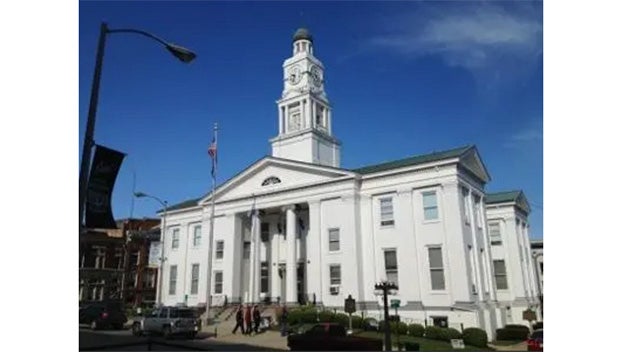Fiscal court hears update on county broadband expansion, will vote on grant agreement
Published 4:36 pm Monday, February 13, 2023

- Clark County Courthouse, Kentucky
|
Getting your Trinity Audio player ready...
|
At Wednesday’s special meeting of the Clark County Fiscal Court, magistrates discussed a broadband infrastructure grant agreement.
The initiative to expand broadband Internet access to all residents of Clark County began shortly before the passing of former Clark County Judge-Executive Chris Pace in the fall of 2021.
Following his death, a regional approach with nearby counties – including Fayette, Woodford, Scott, Madison, Bourbon, and Jessamine – was entered into.
A bid from Spectrum was later accepted and agreed upon by the court to expand services to areas of Clark County that did not have access to high-speed Internet was put out.
“I decided Spectrum was the best way to continue forward,” said Magistrate Dan Konstantopoulos. “We brought it back to the fiscal court and discussed it and said to allow ourselves…to work on negotiations of that contract. We’ve been working on that for quite a while, but I think we’ve got everything here that is beneficial to our community.”
With that in mind, Ben U’Sellis – Director of Government Affairs at Spectrum – was brought to the meeting to answer questions.
Though no action was immediately taken at Wednesday’s meeting – partly because of the rules governing a special session – first and foremost will be ensuring everyone in Clark County has access to high-speed Internet.
“Our teams know these projects are imminent,“said U’Sellis, who is the director of government affairs at Spectrum. “You all are further along and closer than Fayette is at this point.”
The court has a fixed price of contributing $316,000 as a part of the contract, which they initially were concerned they would have to spend more on.
Spectrum will likely invest much more in the project – approximately $8-$9 million – to further its completion.
“Our current speeds are 300 megabytes, 500 megabytes, and then a one-gigabyte symmetrical product,” U’Sellis said. “Everyone will be connected to that.”
The connection process will take place in multiple phases.
For the first twelve months, technicians will be expected to walk the neighborhoods and determine a design, networking, and installation plan.
After twelve months, starting to build and connecting houses will take place.
The project is expected to take as long as three years to connect every household, though the Fiscal Court mentions it will aim to complete it sooner.
“This was our best approach to find a countywide solution [so] that we get everybody that high level of speed,” U’Sellis said.
He acknowledges that, within contractual terms, much of the work needed to be done involves doing so underground.
Magistrate Mark Miller, seeking to clarify information for his constituents, sought to confirm that crews would be crawling underneath any crawlspaces to make sure that areas were hooked up.
U’Sellis confirmed this.
Though the official vote and confirmation of the contract occur at an upcoming meeting, Konstantopoulos sounds assured of its success.
“[I] do not see it not passing unanimously,” he said.




